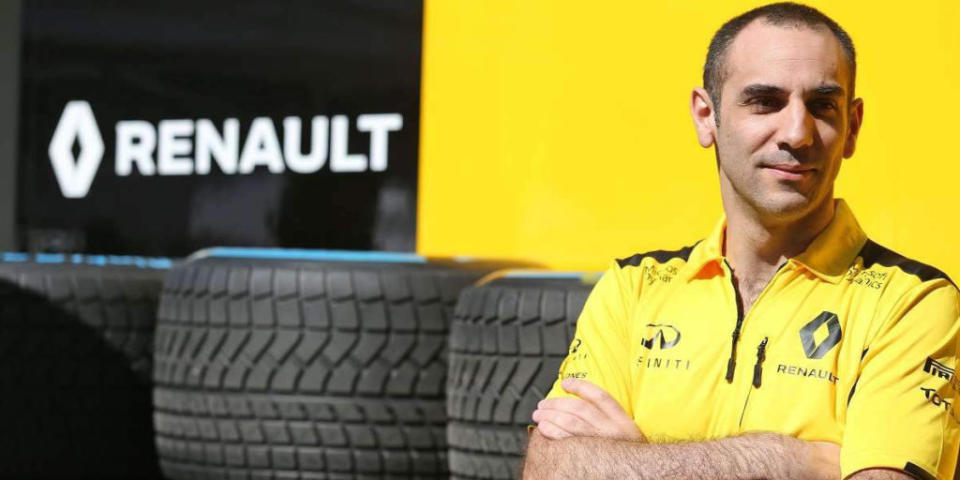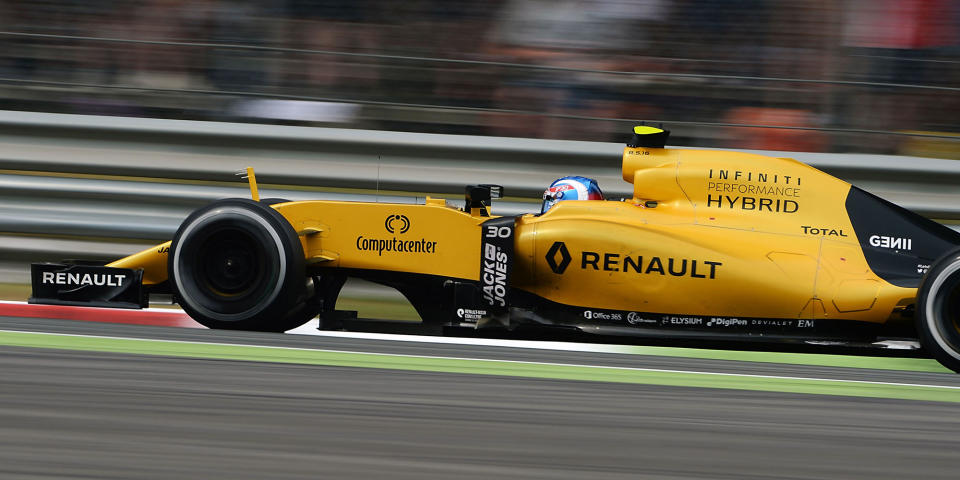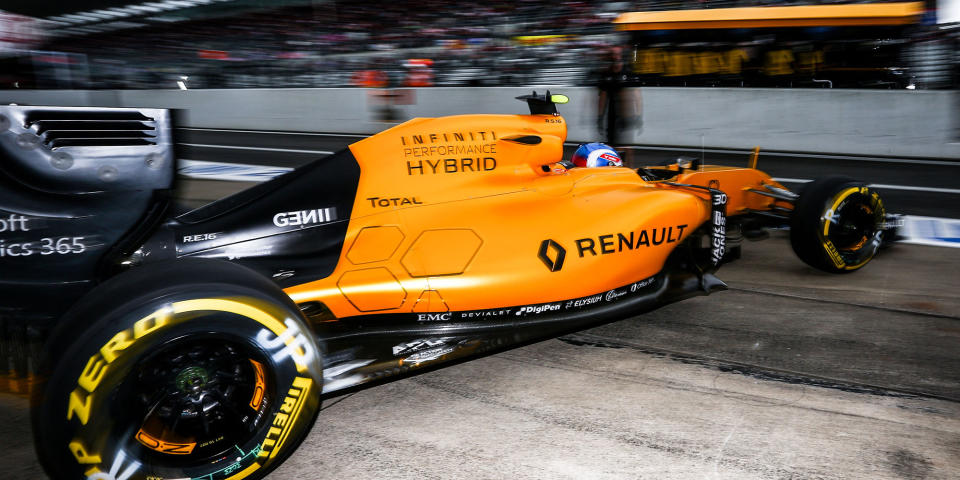How the Managing Director of Renault's F1 Team Wants to Radically Change the Sport

The United States Grand Prix was, in a word, predictable. Lewis Hamilton took pole position, and later, the checkered flag-his 50th career win. Mercedes-AMG teammate Nico Rosberg finished second, with Red Bull's Daniel Ricciardo rounding out the podium in third.
It was a race that lived up to all the cynical criticisms of Formula 1 racing in 2016. The cars were quiet and nearly identical-looking; the racing, after the first few laps, consisted of the perennial leaders running away essentially unchallenged by the rest of the pack.
These are the patent complaints about F1, the gripes you'll here in every garage, pub, or comment thread where fans of the series congregate. But what, realistically, could Formula 1 do to fix this perception?
I spoke with Cyril Abiteboul to find out. The 39-year-old has spent nearly his entire career around Formula 1, mostly with Renault-not counting a short stint as the head of now-defunct Caterham F1. Today, he's Managing Director of the Renault Sport F1 team.
Abiteboul is outspoken and straightforward when he's talking about F1, whether he's praising the sport or eviscerating it. What follows is the conversation we had roughly an hour before the start of the race on Sunday, lightly edited.

Bob Sorokanich: I keep hearing from race fans that Formula 1 isn't as exciting, as emotional, as it used to be. Do you think that's true?
Cyril Abiteboul: It's something that we definitely hear, so there must be an element of truth in it. Frankly, I think the racing has not changed. People say that it's less interesting, that there is less excitement. No, it has not changed. In Formula 1, there have always been only a few overtakings, only a few really impressive maneuvers [per race]. It's all about the start, a couple of laps that are exciting, and then it's all about the strategy. Formula 1 has actually stayed the same, it's the expectation of people that are watching Formula 1 that has changed.
BS: What is it about the audience that's changed?
CA: I think the audience is used to things that are extremely exciting. There is always more and more excitement in everything, everything has to be more spectacular. Look at the extreme sports. If you look at what skateboarding was like 20 or 30 years ago, and compare that to today, it's just crazy. Skiing, snowboarding, it's exactly the same. And that's the thing with Formula 1, unfortunately. A track is still a track, a start is still a start, overtaking has not changed. That, I guess, is the difficulty-there is a challenge to make sure that people continue to buy into what motorsports has to offer. We're still in two dimensions. One day, when we have drone contests, we will be able to involve three dimensions, and that will offer a lot of excitement. The big threat to current motorsports will be [something like] drones.
BS: So how can F1 evolve to those changing audience expectations?
CA: Maybe we need to go towards shorter races. Maybe we need to have visual elements on the cars that are really impressive. I don't know if you know the old video game, Wipeout-maybe that should be the vision of Formula 1. I'm exaggerating, but not that much. It's full of light, it's full of color, it's full of different types of noises. Sometimes you have a booster, but then it's like Mario Kart, and you don't want to go in that direction. Although, we already go a little bit in that direction. But in my opinion, we are a bit too shy, we don't do it in the right way. What I mean is, if you look at the importance of tire management, it's absolutely crazy. It's important to have the tires create some excitement, create some show, create overtaking opportunities and gradient of speed. But there could be a different way to do that, through management of energy, for instance, and that could be much more exciting. And if we really push that we could have a very big gradient of speed that would make overtaking maneuvers just fantastic. I think there are some things intrinsic to motorsports that we cannot alter, but there are an awful lot of things we can do in order to match the expectation of people who are used to sports that are constantly pushing the boundaries.

BS: F1 is so high tech right now, it seems like a casual racing fan almost can't understand what's going on inside the car.
CA: Sometimes the high tech is not visible, it's hidden inside. I think we should completely review the high tech element and be able to have a technology that we can project to the fan, rather than keeping it exclusively internal.
BS: Because the alternate suggestion is that F1 should go low-tech again. Get rid of hybrid, get rid of turbo. Or would that be a ridiculous step backwards?
CA: I fully agree that's an option. In a couple of years we will be surrounded by autonomous driving, so our experience with cars will be completely the same. All cars will have the same technology. So when we are watching Formula 1, we will be wanting to see something completely different. Why not low tech? Or we have to go to the other extreme, which is massively high-tech, but again, a high-tech that is visible from the outside.
BS: Which would you prefer?
CA: It's not about what I prefer, it's about what the automakers prefer, and what's sustainable from an economic perspective. If you look at Formula 1 right now, the business model is dependent upon sponsors, that are here obviously for exposure, but also for technical storytelling. So there is a necessity of the technology, because Formula 1 is expensive. We need support from people who need to tell the story about technology, and therefore, if we go in that model, we need a sort of high-tech version like we just discussed. Now, we could do a completely different model, a Formula 1 that could be low-tech, less expensive, less dependent on the carmakers and the technical partners, but that's completely different. We need to go radical, because right now in my opinion, we're a little too middle of the road, we're a product that is a bit complacent, a bit average. And we cannot afford to be average. We need to be extreme in one of those two ways.
BS: It's an interesting point about autonomous cars. How does a person get excited about a human driver in a world where we no longer drive for ourselves?
CA: That's why your point about low tech is a very good one. Maybe we will need a Formula 1 that is completely different from our experience with cars, because cars will be completely different. So maybe that's the vision of Formula 1, interestingly. But I would say that's a bit of a bullish idea right now because right now the model is based on financial support from all these tech companies.
BS: You mentioned how much of the technology in modern F1 is hidden from the spectators. Is there an aspect of the engineering that you're proud of that the fan just can't see?
CA: Yes, and it's something that's absolutely not visible. What I'm really proud of in F1, and especially in our team, is the capacity to react, to adapt to circumstance. That's just amazing. I'm not aware of any other business where we are capable of changing our product, reviewing, refining, so constantly. It's a little bit like what Apple is doing with the iPhone, where every single year you get a new version of the iPhone, a refinement of the previous. We do a little bit of the same, but we're in a competition that is visible to everyone. We live to compete, and with much more limited resources, obviously, but it's exactly the same. Regulations are changing from one day to the next, and everything you've invested into, everything you did, can be annihilated with a change of regulations. And suddenly you have to immediately react and adapt. Our capacity to do a new car with a new engine on a yearly basis is just absolutely amazing. But frankly, the public, who cares? The car is still yellow. And if you had to remove the colors from the cars, they would all look the same. It's a massive effort that [the different F1 teams] are all doing in parallel, without talking to each other, keeping our secrets very close to our chests, and eventually we all end up with the same car.

BS: So you think that's a bad thing, when all the cars look the same?
CA: The driver has to be the difference. The one thing we don't do well enough is to push the driver, promote the driver. The hero should remain the driver. It should not be the technical director, or anyone else. And I don't think we do a good enough job to position the driver as the hero, as the ambassador of everything we are doing. I think maybe Formula 1 has become too complex. We are surrounding the driver and what he is doing with too many elements, which are to a certain degree diluting what he is doing.
BS: Does fixing that involve letting the drivers be a little less boring to talk to?
CA: Yeah, absolutely. They should sort out their issues themselves-including on the track. I think we should have a governing body that is less quick to interfere. It also means having the capacity to have drivers who are maybe a bit older. Maybe our junior series, feeder series, should be a bit longer. Because it's true, when you take a driver at 17 years old, he doesn't have an awful lot of things to say-his life has been fairly short up to that point. I think that, in general, our drivers are too young. If you compare to the drivers in American motorsports, those guys are grown men. Think about Senna, Prost. That's missing. We just signed a driver who is 29 years old [Ed. note: Nico Hulkenberg], and a number of people have made the observation that maybe he is too old for the job. Frankly, that's bullshit, if you'll excuse my French. He has the perfect balance of experience, he's very capable. Look at one of the most exciting drivers on the grid, Fernando Alonso. He's 35, he's a grown man, and he's very exciting. He's the type of person that you would want to have dinner with. That's what we need.
BS: You've been in F1 for most of your career. In your time in the sport, what's something that's changed for the better, and something that's changed for the worse?
CA: One thing that's good is that we've become a truly global motorsport. When I started I think there were 16 races to the season. And I think 12 of those 16 races were held in Europe. The balance has completely changed-21 races now, with less than 10 in Europe. So that's good in one sense, but I would make the counterargument: When I started, each race was a big thing for the country, for the city. With 21 races, I think we have become maybe a bit less exclusive, and each race is less of a big thing. Including for us, actually. If you talk to the people in the paddock-and maybe I shouldn't say this, but it's an honest question-I don't see the same excitement from the people that travel to all the races, because 21 races is a lot. It takes a lot of your lifetime, of your family time. Whereas when we were at 15 races, everyone was super excited, each race was really a party. And I think if the lucky ones like us, who work in the sport, if we don't feel that it's super exciting to go to a race, I don't see how we can transfer that excitement to the audience outside.

BS: Yeah, from the outside, this seems like it must be the most exciting job in the world. If it just feels like another day at the office for you, I don't know if that's a good thing.
CA: The problem is that indeed, it's a business. Every sport has become a business, but I think in our case, traveling all around the world, multiple jet lag, if you think about it, we're the only sport that's doing that. NBA? Sure, they play every other night, something like that, but they stay more or less in the same continent. Premier League, same thing. The Olympics is big, but that's every four years. So we are the only sport that involves so much effort, from a tech perspective, a commercial perspective, and a human perspective, and all around the world. Plus the testing, plus the winter, and so on and so forth.
BS: So what keeps you coming back?
CA: What's amazing with Formula 1 is the pace at which things can change. Take our example, my example. One year ago, we were nowhere. Our engines were more or less blowing up, race after race. Red Bull was massively pissed off, and terminated their contract, unlawfully. We were unsure whether we would come back as a team, or we would leave the sport forever. And you see one year later, Red Bull is almost fighting against Mercedes, they're ahead of Ferrari. We are back as a team. Okay, we are not doing so well, but we are back as a team, we have a long term commitment, so in one year, things have completely changed. I'll give you one other example. Sebastian Vettel, I remember having a discussion with him, to talk about the evolution of the Renault engine. This was before he moved from Red Bull to Ferrari. He was not convinced, he saw the difficulties that we had for two years, with the new regulations on the engine side, and he moved to Ferrari. Last year, everyone thought he was a genius to do that. But look at this year. Everyone is thinking, where is Ferrari, what's happening with Sebastian? So from one year to the next, things changed completely. That's what's fun, and to a certain degree it's almost a lesson about life. Decisions that can look very good, the next day-and I mean the next day-can look completely different. I think that's what keeps all of us into this, the drivers, the team managers, the engineers. It's a place where things are changing, developing. It's like a soap opera.
You Might Also Like

 Yahoo Autos
Yahoo Autos 